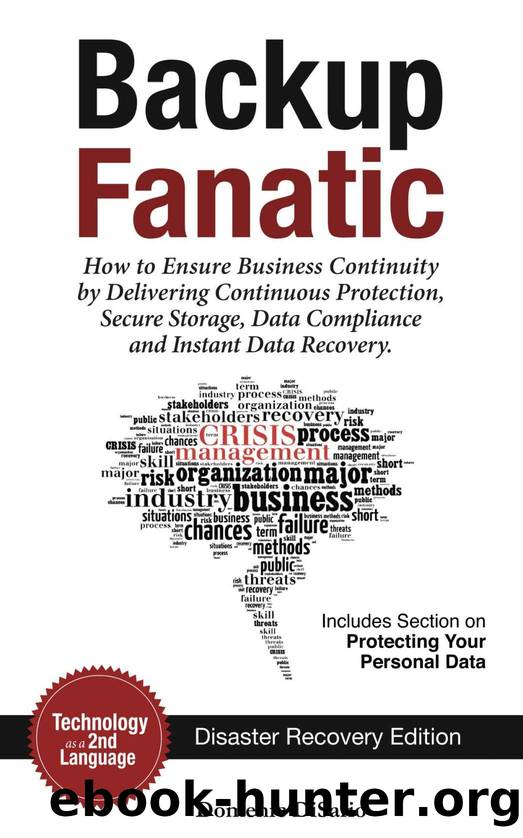Backup Fanatic: How to Ensure Business Continuity by Delivering Continuous Protection, Secured Storage, Data Compliance, and Instant Data Recovery by Domenic DiSario

Author:Domenic DiSario [DiSario, Domenic]
Language: eng
Format: azw3
Published: 2015-04-28T16:00:00+00:00
How to Protect Your Personal
Data in the Event of a Disaster
Susan: Can you talk to us about what to do when you work remotely? How can you stay protected then? A lot of people are very mobile; they work from home, but not all the time, and they travel with their laptops. What do you recommend in that scenario?
Domenic: Trying to manage the situation you describe is a real challenge for companies these days. And itâs not just about protecting the data they lose invariably on these devices because they are not performing local backup on their system nor is their data being transferred to the companiesâ main servers for companywide backup.
Thereâs a local copy of the last couple of monthsâ worth of emails on my iPhone. From a data protection point of view, in this particular case, the email is not a big deal, right? If I lose my iPhone, I buy a new one, re-sync it, and Iâm good. But what about from a security point of view?
What if those emails on my phone have protected information, and Iâm in danger of violating various state and federal privacy regulations? Some regulations state if you have any two pieces of information, a social security number, bank account, first name, last name, insurance number then that combination of data needs to be protected and encrypted.
If you are HIPAA regulated and you lose your phone, and you know that there were emails on that phone with protected information and the phone wasnât encrypted and locked, you are legally obligated to turn yourself in. And if you donât turn yourself in, Iâm legally obligated to turn you in.
Data on mobile devices is a big deal because it is mobile, and therefore can be lost easily. It is estimated that one out of every 10 laptops is going to be stolen. The problem is one of comprehension. Sometimes laptop owners do not seem to understand they have company information on their local drive.
Or maybe they do understand, and theyâre just not careful. They copy to their laptop the three spreadsheets they want to work on over the weekend, and then their laptop is stolen. Or, maybe worse than that, they work the whole weekend and their laptop is stolen on Sunday night. So not only is there a possible data breach, but all that work they did is gone because they did not upload their modified sheets to the server.
There are a lot of data backup and malware considerations with mobile computing, which makes encryption a very big thing. I could lose this phone with 1,000 HIPAA regulated records, and if it is encrypted, I do not even have to report it. But if I had one piece of HIPAA protected information on it that was not encrypted, Iâd have to report it as a data breach.
Not only are mobile devices easy to loseâtheyâre also easy to break.
These devices need to be backed up and protected from physical damage, which is much overlooked.
Download
This site does not store any files on its server. We only index and link to content provided by other sites. Please contact the content providers to delete copyright contents if any and email us, we'll remove relevant links or contents immediately.
Zero to IPO: Over $1 Trillion of Actionable Advice from the World's Most Successful Entrepreneurs by Frederic Kerrest(3939)
Harry Potter and the Goblet Of Fire by J.K. Rowling(3581)
Never by Ken Follett(3489)
Machine Learning at Scale with H2O by Gregory Keys | David Whiting(3440)
Ogilvy on Advertising by David Ogilvy(3289)
Shadow of Night by Deborah Harkness(3154)
The Man Who Died Twice by Richard Osman(2777)
Book of Life by Deborah Harkness(2696)
My Brilliant Friend by Elena Ferrante(2675)
How Proust Can Change Your Life by Alain De Botton(2588)
0041152001443424520 .pdf by Unknown(2569)
Will by Will Smith(2547)
The Tipping Point by Malcolm Gladwell(2528)
How to Pay Zero Taxes, 2018 by Jeff A. Schnepper(2456)
Purple Hibiscus by Chimamanda Ngozi Adichie(2418)
Hooked: A Dark, Contemporary Romance (Never After Series) by Emily McIntire(2397)
Rationality by Steven Pinker(2123)
Borders by unknow(2091)
Daughter of Smoke and Bone by Laini Taylor(2056)
